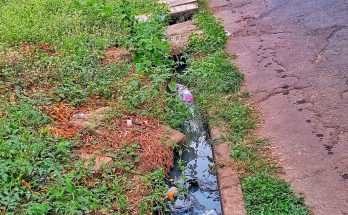By Foyin Ejilola
In recent times, there has been a sudden surge of Covid-19 cases in Nigeria. On Thursday, August 12, 2021, the Nigeria Centre for Disease Control (NCDC) recorded the highest number of cases. According to the report on their website, 753 new covid cases and 5 deaths were confirmed in Nigeria. The new cases were reported from fourteen states, with Lagos having the highest number of cases of three hundred and sixty-four cases, followed by Akwa Ibom with a hundred and forty-one cases, while Oyo state had seventy-four cases. It was also stated in the report that since the outbreak of the virus till that very moment, 180,661 Covid cases have been confirmed in all the 36 states in Nigeria, including the Federal Capital Territory (FCT), and 166,560 of them have been discharged while 2,200 deaths have been recorded.
These new cases are detected to be infected with the newest SARS-CoV-2 variant, called the Delta Strain. The Delta strain with the scientific name B.1.617.2 was first identified in India in October 2020 and was first detected in Mexico on April 21, 2021. Before the outbreak of this newest variant was the gamma variant and both of them are identified as ‘variants of concern’ as they have similar characteristics of faster transmission from one person to many others, the severity of the virus, and even, the possibility of evading vaccines. The Delta strain has since spread to other countries and is now the second most dominant strain in Mexico, after gamma, which is the variant of the 2020 pandemic.
With the reports of the sudden surge in cases of Nigerian residents who have caught this newest strain, it is clear that Nigeria may be heading for the third wave of Covid-19 owing to many factors first of which is the different attitudes of Nigerians to the virus. From the end of the last lockdown to the point of the surge of this newest strain, many Nigerians have already let down their guards with the belief that the virus is no more. This can be seen in the way people no longer wear their nose masks, do not maintain the recommended 6-meter distance, and throw parties with a large crowd in attendance.
Furthermore, a lot of people do not know of the Delta strain or how fast it can be transmitted and this could be dangerous. The Delta strain of SARS-CoV-2 has been confirmed to be 75% contagious and twice as transmissible as the previous strain. In this case, most of the preventive measures that were prescribed during the last strain may no longer be fully effective in curbing the spread of the virus as people are likely to contract the virus twice as faster as before.
Another danger that may be posed by knowing nothing about the Delta strain covid variant is the confusing symptoms that an infected person may have. In most cases, infected patients may be asymptomatic. Its symptoms can be mistaken for a mild illness. Some of the major symptoms include a headache, sore throat, and a runny nose which may be described as a bad cold which is among the commonest illnesses in Nigeria. Therefore, detecting if one has contacted the Delta variant of Covid-19 through symptoms has become more difficult than the previous Gamma variant that has its strongest markers as loss of smell, loss of taste, fever, serious sneezing and coughing. The symptoms of the virus may make it impossible for anyone who has contacted it to make anything of it as they may dismiss it as a common cold.
One important thing to know about this newest covid strain is its ability to affect people who are not fully vaccinated, leaving unvaccinated people at very high risk. In Nigeria, the people that are currently vaccinated are greatly outnumbered by the people who are not fully vaccinated and have not been vaccinated at all. At the weekly ministerial Press briefing at the presidential villa in Abuja, Dr Faisal Shuaib, the Executive Director of the National Primary Health Care Development Agency (NPHCDA), disclosed that only 176,000 doses of Johnson & Johnson vaccines have already been received while the rest will come in batches. He also said that 2.3 per cent of Nigerians have already been vaccinated. Besides the insufficient vaccines in the country, there are many Nigerians who would not willingly get vaccinated because of their religious conventions against the vaccine as being a tool of the devil. Many people have also expressed their fears against the side effects of vaccines.
While going on another lockdown may seem to be an effective option, the Federal Government of Nigeria is not considering it at this point as they have learnt their lessons from the lockdown that was implemented last year. The Minister of Health, Osagie Ehanire, made this known at the weekly press briefing at the presidential villa in Abuja. The reasons he gave include the negative impact of the previous lockdown on the economy of Nigeria, businesses, and the restriction of freedom and movement on the part of the citizens.
The reasons given by the Minister of Health can be described as reasonable judging from how the economy has taken a nosedive since the last lockdown and there has been extravagant inflation in the prices of commodities. However, tertiary institutions that have begun physical classes such as the University of Ibadan, may be taking a huge risk if they decide to continue.
Just like many Nigerians have slackened in their precautions against Covid-19, the University of Ibadan students and lecturers are not left out. The use of nose masks is only enforced at the point of entry(gate) into the university. There are also many large gatherings where people interact without their masks on and zero social distancing. In this case, if a person who is infected with the Delta strain gains entry into the campus with their nose mask and then remove it on getting into the campus, many people would contract the virus in a matter of minutes. This is one of the major reasons why going back to the virtual system for the rest of the second semester of the 2020/2021 academic session may be the best option for curbing the spread of the virus on the university campus.
If the University of Ibadan is however planning to go virtual, which may be to the dissatisfaction of many students, it is important that they learn their lessons from the shortcomings in the previous semester.
While the university’s management has not addressed the students on the steps the university may take, it is safe to assume that the physical classes are still going on. It is also important for every student to start abiding by the preventive measures to protect themselves against the newest strain of Covid-19 as they move about in the University during physical activities. The measures include the religious use of a nose mask and hand sanitiser, minimal contact with humans and objects, maintaining social distancing, and avoiding large gatherings if need be.



